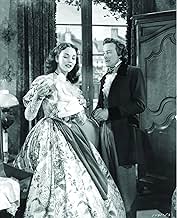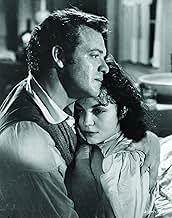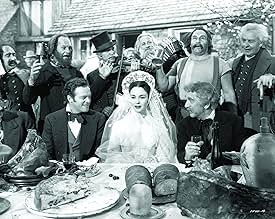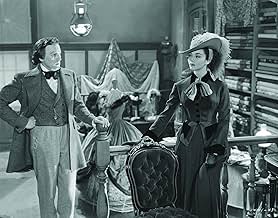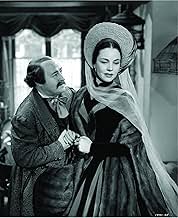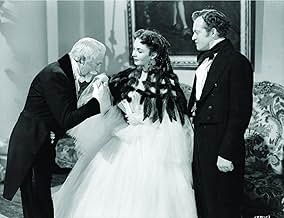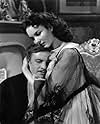IMDb रेटिंग
7.0/10
3.1 हज़ार
आपकी रेटिंग
अपनी भाषा में प्लॉट जोड़ेंA provincial doctor's wife's romantic illusions about life and social status lead her to betray her naive husband, take on lovers, and run up ruinous debts.A provincial doctor's wife's romantic illusions about life and social status lead her to betray her naive husband, take on lovers, and run up ruinous debts.A provincial doctor's wife's romantic illusions about life and social status lead her to betray her naive husband, take on lovers, and run up ruinous debts.
- 1 ऑस्कर के लिए नामांकित
- 2 जीत और कुल 1 नामांकन
Alf Kjellin
- Leon Dupuis
- (as Christopher Kent)
Harry Morgan
- Hyppolite
- (as Henry Morgan)
फ़ीचर्ड समीक्षाएं
Gustave Flaubert's Madame Bovary is beautiful and shocking, one of the European literary greats. While it is not the most faithful adaptation around, Vincente Minnelli's Madame Bovary does stand on its own two feet and is a beautiful film in its own right. It does suffer from what made the book so complex and shocking not being fully allowed to come out due to the limitations of the Production Code at the time of it being made and released(maybe the film's length too). So you do miss the stuffiness and hypocrisy of French provincial life, which I always took as a crucial part to Emma's character, while the script could have done with more of a dark edge and Minnelli's direction is often dazzling and technically skilled(the ballroom sequence has to be a highlight in his directorial career) but also a little too relaxed in places, so the drama has occasional stodginess. But it is unfair to dismiss Madame Bovary due to these because its positives are a great many. That it is one of the most visually beautiful films of the 40s is one, the costumes are evocative and astonishingly elegant, Emma's dresses are a wow factor while the sets are the very meaning of grand with a Baroque/Roccocco influence. The photography dazzles just as much as Minnelli's technical style in the ballroom sequence(an intricate and in all senses wonderful scene, perhaps one of the greats in cinematic history). Miklos Rosza's music score is another huge part of the appeal, one of his best, the stylistic elegance, haunting undercurrent and energy are all here in the score, the Madame Bovary Waltz being the most memorable.
The script may lack edge, but it does maintain the book's ironic humour and is very poignant too without descending into melodrama, and the story regardless of the watering down still compels and moves. Some may find Flaubert's narration and trial at the beginning unnecessary, to me it was actually very interesting- James Mason's thoughtfully earnest performance as Flaubert helps- and that the book itself caused a scandal at the time and is still controversial now made it further easier to understand why the book's depth doesn't quite come through here. The aforementioned ballroom sequence is the highlight of the film, but the deserted windswept streets in the middle of the night scene where Emma is waiting for Rudolphe is beautifully shot and emotionally telling. The performances are fine, Jennifer Jones is very moving(not to mention stunning to look at), she does capture the selfishness and insufferable woman traits that Emma has yet makes it clear Emma is also a victim of her own passions, it is very easy to not stand Emma and make her one-dimensional but with Jones there is a degree of compassion. Van Heflin is sympathetic and mild-mannered without being too much of a bore and oafish without being too much of a dork and clown, like with Jones both of those are easy traps to fall into. Louis Jourdan is perfectly cast, suave and charismatic while conflicted and menacing. Alf Kjellin is a gentle Leon, a good contrast to Jourdan's Rudolphe, while Gladys Cooper as ever is a scene stealer as is Frank Allenby as the malefic L'Hereux. Harry Morgan and Gene Lockhart are dependably solid. Overall, a beautiful film but those wanting a faithful adaptation of Madame Bovary(a big ask really as it is perhaps one of the most difficult books to adapt) may want to look elsewhere. But even then, there will be people who think that to some extent but still take this film for what it is. 8/10 Bethany Cox
The script may lack edge, but it does maintain the book's ironic humour and is very poignant too without descending into melodrama, and the story regardless of the watering down still compels and moves. Some may find Flaubert's narration and trial at the beginning unnecessary, to me it was actually very interesting- James Mason's thoughtfully earnest performance as Flaubert helps- and that the book itself caused a scandal at the time and is still controversial now made it further easier to understand why the book's depth doesn't quite come through here. The aforementioned ballroom sequence is the highlight of the film, but the deserted windswept streets in the middle of the night scene where Emma is waiting for Rudolphe is beautifully shot and emotionally telling. The performances are fine, Jennifer Jones is very moving(not to mention stunning to look at), she does capture the selfishness and insufferable woman traits that Emma has yet makes it clear Emma is also a victim of her own passions, it is very easy to not stand Emma and make her one-dimensional but with Jones there is a degree of compassion. Van Heflin is sympathetic and mild-mannered without being too much of a bore and oafish without being too much of a dork and clown, like with Jones both of those are easy traps to fall into. Louis Jourdan is perfectly cast, suave and charismatic while conflicted and menacing. Alf Kjellin is a gentle Leon, a good contrast to Jourdan's Rudolphe, while Gladys Cooper as ever is a scene stealer as is Frank Allenby as the malefic L'Hereux. Harry Morgan and Gene Lockhart are dependably solid. Overall, a beautiful film but those wanting a faithful adaptation of Madame Bovary(a big ask really as it is perhaps one of the most difficult books to adapt) may want to look elsewhere. But even then, there will be people who think that to some extent but still take this film for what it is. 8/10 Bethany Cox
Three versions stand out as far as Flaubert's classic is concerned:the Jean Renoir one,with Valentine Tessier,which has not worn well,the acting has become unconvincing and almost lurid when you see it today,Minelli's version and Claude Chabrol's starring Isabelle Huppert ,which doesn't avoid totally academism,despite Jean-François Balmer's portrayal of Charles that steals the show . Now for Minelli 's attempt:some have been hard on his rendition,and however,it features the best Emma ever:Jennifer Jones,the romantic heroine par excellence.Her savage beauty,looking tense,triumphs here. The supporting acts are well-chosen:Van Heflin is oafish,meek.The French Louis Jourdan is well-cast as Rodolphe Boulanger,Emma's lover who betrays her and leaves her to despair.Their final confrontation,in Boulanger's luxury mansion oozes hatred and contempt. The main drawback is the rural background:Minelli did not realize how this country life disgusted Emma:the wedding,a very very peasant one ,which Flaubert describes in lavish detail,is too short on the screen.The farms are too clean-Emma dreamed her childhood away because she could not stand the mediocrity of her milieu.She jumped out of the frying pan into the fire:a two-bit doctor,a would-be sawbones who 's totally incompetent.Van Heflin's rendering makes up for Minelli's weaknesses.The movie is sandwiched between two brief scenes of Flaubert 's trial (He was accused of immorality in his book),that's redundant.It would have been better to tell the audience about Emma's daughter's terrible fate:after the doctor's death,an orphan,she becomes a worker in a spinning mill.Supreme decay for a mother who was longing to be a socialite.
Films of great novels are usually light years away in terms of quality from their originals. There are of course a few exceptions, the David Lean Dickens adaptations for instance and recently a Neil Jordan version of Graham Greene's "The End of the Affair" that I much admired. Generally it is second rate literature, "Gone WIth the Wind" a prime example, that fares so much better. Flaubert's "Madame Bovary" has continued through the history and development of cinema and TV to exert its fascination on would-be translators, although it has to be admitted that it has generally proved elusive. One would have thought that it would have fared particularly well in the hands of outstanding French directors such as Renoir and Chabrol but their efforts to come to grips with Flaubert's masterpiece have ultimately to be judged as among their lesser works. There is quite a lot going for Jean Renoir's early 1933 version, not least the authentic Normandy exteriors shot with great affection, but technically the film shows its age. It is rather like a series of tableaux, some in themselves quite well done, but ultimately lacking a strong narrative thrust and sense of cohesion. Nevertheless I remember being more impressed with it than with Claude Chabrol's 1991 version which I found surprisingly cold and passionless. I admit I have only seen this once and my memory of it is far from clear, perhaps because it grabbed me so little at the time. It may seem rather preposterous to award the accolade for the best "Bovary" to Vincente Minnelli's Americanised 1949 MGM version with its studio mock-up of a French village that seems more of a Flanders lookalike and some location work clearly done in Californian woodland, but, in the absence of so little competition, I would have to plump for it as being certainly the most enjoyable. After all it has that quite exquisite beauty, Jennifer Jones, as the eponymous heroine, suffering and eventually dying as tenderly as only she can. My favourite memory from the film is her first appearance on the farm where Doctor Bovary is calling to tend to her sick father. There she is in a setting of all too believable rural squalor decked out in the most unbelievably opulent dress imaginable. If nothing else it makes Bovary's initial besottedness with her absolutely credible. Minnelli's is a rather sanitised adaptation. Okay to have the heroine die beautifully once the initial agony of taking poison has been established, but the inevitable outcome of a botched operation on a villager's clubfoot - amputation - is, unlike in the novel and other versions, evaded by the doctor's refusal to take on the medical challenge. It makes for rather more comfortable box-office. There are some beautifully done scenes including the almost obligatory inclusion in a Hollywood period piece of a ballroom sequence. The one here has the hedonistic movement that is everything we had come to expect from "The Great Waltz" onwards. There is also the heroine's wait, her bags fully packed in a windswept street after dark for the lover that never comes. Wyler did it rather better in "The Heiress" but Minnelli's has plenty of atmosphere. His version may be even further than its competitors from Flaubert's "Madame Bovary" but he invests it with enough passion and commitment to ensure it a small place in Hollywood history.
Film opens at Flaubert's (Mason) 1857 trial for obscenity in France. After the prosecution finishes its' case, Flaubert answers; his answer frames a flashback to Emma Bovary's (Jones) story.
She grows up on an isolated farm, and is further isolated by her convent education. She grows up believing and fantasizing about love and romance, and that they happen in real life as in fiction. When Dr. Bovary (Heflin) comes to treat her fathers' broken leg, she sees him as her Prince Charming and falls in love with him. After the two marry, they go to the village in Normandy where Charles lives. .
Jones is extraordinary as Madame Bovary. She hits all the right notes as a girl who can't/doesn't separate fantasy from reality. She is marvelously subtle as a woman who switches from role to role in her fantasy life, and doesn't let reality intrude until it's too late. She at least deserved a Best Actress nomination from the Academy.
Van Heflin is good if overemphatic and too American as Emma's husband. Louis Jourdan is just about perfect as Emma's seducer who literally sweeps her off her feet. James Mason is fine as Flaubert.
Miklos Rozsa contributed a fine score, with especially notable music for the ball scene. Vincent Minnelli's direction is subtle. This is a very good film for a tearjerker. Jones and Minnelli are at their best.
She grows up on an isolated farm, and is further isolated by her convent education. She grows up believing and fantasizing about love and romance, and that they happen in real life as in fiction. When Dr. Bovary (Heflin) comes to treat her fathers' broken leg, she sees him as her Prince Charming and falls in love with him. After the two marry, they go to the village in Normandy where Charles lives. .
Jones is extraordinary as Madame Bovary. She hits all the right notes as a girl who can't/doesn't separate fantasy from reality. She is marvelously subtle as a woman who switches from role to role in her fantasy life, and doesn't let reality intrude until it's too late. She at least deserved a Best Actress nomination from the Academy.
Van Heflin is good if overemphatic and too American as Emma's husband. Louis Jourdan is just about perfect as Emma's seducer who literally sweeps her off her feet. James Mason is fine as Flaubert.
Miklos Rozsa contributed a fine score, with especially notable music for the ball scene. Vincent Minnelli's direction is subtle. This is a very good film for a tearjerker. Jones and Minnelli are at their best.
Although it is several years since I saw it I can remember the beautiful photography and period setting of this not very happy story of a tormented woman.Particularly Jennifer Jones,a vastly underrated actress giving a sensitive performance which one imagined could have done with a bit more directoral guidance. Minnelli was one of those directors who seemed to give all or nothing to his projects.By his own admission he had very little interest in "Kismet" as he wanted to get it out of the way in order to start "Lust for Life" with Kirk Douglas.The lumbering manner of "Kismet" shows this to be true !! (he owed MGM one picture under his contract before starting "Lust for Life" and unfortunately for the project "Kismet" was it)Additionally Minelli did not want Jones in the lead role and one wonders how influencial David Selznick was in pushing for Jennifer once Lana Turner was unavailable for the lead.At any rate Lana had not yet developed her dramatic abilities which would lie some years ahead.Jennifer showed that she was adaptable to many moods including a few years later her scene stealing turn in "Beat the Devil" few actresses can take credit for stealing a picture away from Bogie,Peter Lorre,Robert Morley and LaLolla. Back to Madame Bovary,although the subject is a heavy one,it is well handled by Minnelli,and most reference books today regard it as a sadly neglected piece,which deserves a wider recognition.Interestingly if my memory serves me correctly Vincente barely mentions it in his autobiography.Maybe his private life at the time and his more financially successful works figure more prominantly in his memory.If I had directed Madame Bovary I would be immensly proud of it.Maybe he was.
क्या आपको पता है
- ट्रिवियाAfter the expensive box-office failure of The Pirate (1948), director Vincente Minnelli worked hard to cut corners on this film, fearing he might be accused of extravagance. However, he devoted a great deal of time to the ball sequence, which he regarded as the most important scene in the film; he even had composer Miklós Rózsa compose the waltz theme used in it well in advance of the start of filming.
- गूफ़When Madame Bovary asks Leon for money, he reacts by punching out one of the glass window panes. But on the next cut, the previously shattered window pane is now intact.
- भाव
Emma Bovary: Do you know, Charles, why that clock strikes? To announce the death of another hour.
- इसके अलावा अन्य वर्जनAlso shown in a computer colorized version.
- कनेक्शनFeatured in Some of the Best: Twenty-Five Years of Motion Picture Leadership (1949)
टॉप पसंद
रेटिंग देने के लिए साइन-इन करें और वैयक्तिकृत सुझावों के लिए वॉचलिस्ट करें
Everything New on HBO Max in August
Everything New on HBO Max in August
Looking for something different to add to your Watchlist? Take a peek at what movies and TV shows are coming to HBO Max this month.
- How long is Madame Bovary?Alexa द्वारा संचालित
विवरण
- रिलीज़ की तारीख़
- कंट्री ऑफ़ ओरिजिन
- आधिकारिक साइट
- भाषा
- इस रूप में भी जाना जाता है
- Madame Bovary und ihre Liebhaber
- फ़िल्माने की जगहें
- उत्पादन कंपनी
- IMDbPro पर और कंपनी क्रेडिट देखें
- चलने की अवधि
- 1 घं 54 मि(114 min)
- रंग
- पक्ष अनुपात
- 1.37 : 1
इस पेज में योगदान दें
किसी बदलाव का सुझाव दें या अनुपलब्ध कॉन्टेंट जोड़ें


